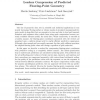Free Online Productivity Tools
i2Speak
i2Symbol
i2OCR
iTex2Img
iWeb2Print
iWeb2Shot
i2Type
iPdf2Split
iPdf2Merge
i2Bopomofo
i2Arabic
i2Style
i2Image
i2PDF
iLatex2Rtf
Sci2ools
122
click to vote
CAD
2005
Springer
2005
Springer
Lossless compression of predicted floating-point geometry
The size of geometric data sets in scientific and industrial applications is constantly increasing. Storing surface or volume meshes in standard uncompressed formats results in large files that are expensive to store and slow to load and transmit. Scientists and engineers often refrain from using mesh compression because currently available schemes modify the mesh data. While connectivity is encoded in a lossless manner, the floating-point coordinates associated with the vertices are quantized onto a uniform integer grid to enable efficient predictive compression. Although a fine enough grid can usually represent the data with sufficient precision, the original floating-point values will change, regardless of grid resolution. In this paper we describe a method for compressing floating-point coordinates with predictive coding in a completely lossless manner. The initial quantization step is omitted and predictions are calculated in floating-point. The predicted and the actual floating-...
CAD 2005 | Floating-point | Floating-point Values | Lossless Manner | Theoretical Computer Science |
| Added | 15 Dec 2010 |
| Updated | 15 Dec 2010 |
| Type | Journal |
| Year | 2005 |
| Where | CAD |
| Authors | Martin Isenburg, Peter Lindstrom, Jack Snoeyink |
Comments (0)

